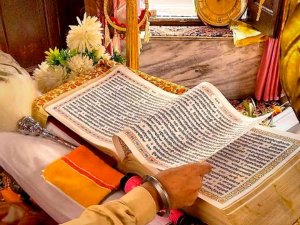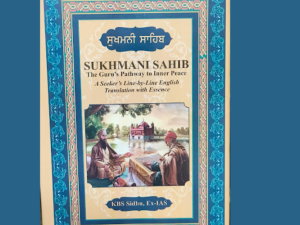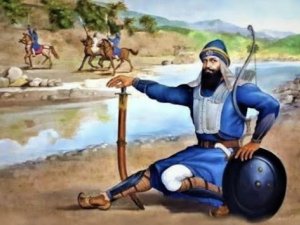In Punjabi folk songs, Sikhism has been portrayed and celebrated in numerous ways. These songs capture the essence of Sikh values and ideals, passing them down through generations. The melodious voice of folk culture resonates with the hearts of Punjabis, creating a strong and vibrant. According to Prof Mohan Singh :
ਆ ਪੰਜਾਬ ਪਿਆਰ ਤੂੰ ਮੁੜ ਆ । ਆ ਸਿੱਖ ਪੰਜਾਬ ਤੂੰ ਘਰ ਆ।
When delving into Punjabi literature, one can observe the influence of historical motifs on folk songs. Over the years, Punjabis have been inspired by four significant factors: beauty, bravery, egoism, and a deep sense of spirituality. As Punjab is a border state, its people have faced numerous challenges such as invasions, plundering, violence, and deprivation. This constant struggle for survival has instilled courage, resilience, a broad perspective on life, patriotism, and a strong faith in God within every Punjabi's heart. The amalgamation of saintliness and warrior spirit has adorned Punjabi culture with a unique charm and unwavering faith. The rich tapestry of raga, clear life principles, harmonious coexistence, and imaginative literature, including a special place for folk poetry, embody the moral values and essence of Sikhism. These are the magnificent fruits that have blossomed from the seeds of divine beauty and beautiful divinity, shaped by love.
Through Punjabi folk songs, Sikhism finds expression. These songs beautifully encapsulate the qualities of Guru Nanak Dev ji and serve as a testament to our rich cultural heritage. They preserve the teachings and virtues of Sikh Gurus, ensuring their continued influence and inspiration in the lives of Punjabis.
ਬਾਬਾ ਨਾਨਕ ਜਿਹਾ ਭਗਤ ਨਾ ਕੋਈ, ਜਿਨ ਹਰਿ ਕਾ ਨਾਮ ਪਛਾਤਾ।
ਹੱਟ ਖੁੱਲ੍ਹ ਗਈ ਬਾਬੇ ਨਾਨਕ ਦੀ, ਸੌਦਾ ਲੈਣਗੇ ਨਸੀਬਾਂ ਵਾਲੇ।
ਮਿੱਠੀ ਲਗਦੀ ਗੁਰੂ ਤੇਰੀ ਬਾਣੀ, ਵੇਲੇ ਅੰਮ੍ਰਿਤ ਦੇ।
ਸਾਡੇ ਗੁਰਾਂ ਨੇ ਜਹਾਜ ਬਣਾਇਆ, ਆਵੇ ਕਿਸੇ ਪਾਰ ਲੰਘਣਾ ।
Guru Nanak ji fearlessly raised his voice against the oppression of the Mughals and sacrificed his comforts to stand for what was right. He denounced tyrants and oppressors as embodiments of sin and injustice.
The atrocities committed by Ahmed Shah Abdali during his attacks and looting are often reflected in our folk songs.
ਰਾਜੇ ਸ਼ੀਂਹ ਮੁਕੱਦਮ ਕੁੱਤੇ। ਜਾਏ ਜਗਾਇਨ ਬੈਠੇ ਸੁੱਤੇ
ਕਾਜ਼ੀ ਹੋ ਕੇ ਬਹੇ ਨਿਆਏ। ਵੱਢੀ ਲੈ ਕੇ ਹੱਕ ਗਵਾਏ।
ਪਾਪ ਕੀ ਜੰਝ ਲੈ ਕਾਬਲੋੰ ਧਾਇਆ , ਜੋਰੀ ਮੰਗੇ ਦਾਨ ਵੇ ਲਾਲੋ।
ਖਾਧਾ ਪੀਤਾ ਲਾਹੇ ਦਾ , ਬਾਕੀ ਅਹਿਮਦ ਸ਼ਾਹੇ ਦਾ।
In our folk songs, the subedar of Lahore, Mir Mannu, is depicted as a tyrant who inflicted great suffering upon the Sikhs. References to Mir Mannu's atrocities are commonly found in our folk songs.
ਮੱਨੂੰ ਅਸਾਡੀ ਦਾਤਰੀ, ਅਸੀਂ ਮੱਨੂੰ ਦੇ ਸੋਏ।
ਜਿਉਂ ਜਿਉਂ ਮੱਨੂੰ ਵੱਢਦਾ, ਦੂਣ ਸਵਾਏ ਹੋਏ।
These songs also celebrate Guru Gobind Singh ji, who is revered as a great heritage and symbol of glory in our times.
The themes of "Dharma" (righteousness) and "Guru" (spiritual teacher) frequently appear in our folk songs. These songs are deeply loved by those who yearn for a glimpse of Guruji, expressing their longing and devotion.
ਓ. ਜਿੱਥੇ ਬੈਠੇ ਕਲਗੀਆਂ ਵਾਲੇ, ਧਰਤੀ ਨੂੰ ਭਾਗ ਲੱਗ ਗਏ।
ਅ. ਤੇਰੀ ਅੱਧ ਬੀਤਦੀ ਜਾਵੇ, ਭਜ ਗੁਰੂ ਗੋਬਿੰਦ ਨੂੰ।
ਏ. ਚੱਲੋ ਸਈਓ ਚਲ ਦਰਸ਼ਨ ਕਰੀਏ , ਗੁਰੂ ਗੋਬਿੰਦ ਸਿੰਘ ਆਏ।
ਬਈ ਆਪਣੇ ਲਾਲ ਜਿਨ੍ਹਾਂ , ਕੰਧਾਂ ਵਿੱਚ ਚਿਣਵਾਏ।
The sacrifices of the Sahibzades, the sons of Guru Gobind Singh, are widely mentioned in our folk songs.
ਬੇੜੇ ਸੱਚ ਦੇ ਓਟ ਖ਼ਿਜਰ ਦੀ, ਕੂੜ ਤਾਂ ਡੁੱਬਣਾ ਡੂੰਘ-ਵਹੀਰ ।
ਗੱਲਾਂ ਸਾਹਿਬਜਾਦਿਆਂ ਦੀਆਂ ਸੁਣ ਕੇ, ਵਜ਼ੀਦ ਖਾਂ ਦੇ ਮੱਥੇ 'ਤੇ ਗਏ ਨੇ ਪੈ ਵਟਕੀਰ।
ਮੌਲਵੀਆਂ ਸੁਣੇ ਜਵਾਬ ਤਕਰੇੜੇ, ਹਨਾਂ ਦੀ ਵੀ ਹਿੱਕ 'ਤੇ ਗਈ ਏ ਫਿਰ ਸ਼ਮਸ਼ੀਰ ।
ਗ਼ੱਦਾਰ ਤੇ ਕਾਇਰ ਸੁੱਚਾ ਨੰਦ ਕੋਲੋਂ ਬੋਲਿਆ , ਬੋਲਿਆ ਏ ਸੱਪਾਂ ਦੇ ਪੁੱਤਰ ਕਦੀ ਮਿੱਤਰ ਹੁੰਦੇ
ਭਾਵੇਂ ਪਲਾਈਏ ਪਿਲਾ ਕੇ ਚੁਲੀਆਂ 'ਤੇ ਸ਼ੀਰ । ਮਾਸੂਮ ਨੂੰ ਮਾਰਨਾ ਕਿਹੜੇ ਮਜ਼੍ਹਬ 'ਚ ਲਿਖਿਆ ਏ।
ਕੋਲੋਂ ਬੋਲਿਆ ਏ ਖ਼ਾਨ ਮਾਲੀਰ। ਜੇ ਇਹਨਾਂ ਨੂੰ ਮਾਰੋ ਤੇ ਤੁਸੀਂ ਕਾਹਦੇ ਮੋਮਨ ਹੋ ?
ਕਿਉਂ ਜੁਲਮ ਦੀ ਚਾ ਕਰੋ ਅਖ਼ੀਰ ? ਸਾਹਿਬਜਾਦੇ ਅਹਿਦੇ, ਅਸਾਂ ਧਰਮ ਨਾ ਛੱਡਣਾ,
ਅਸਾਂ ਪੱਥਰ ਤੇ ਛੱਡੀ ਏ ਖਿੱਚ ਲਕੀਰ।
ਭੁੱਲ ਕੇ ਇਹਨਾਂ ਫੇਰ ਪੇਸ਼ ਕਰੋ ਤਾਂ ਵੇਖੀਏ, ਜੇਕਰ ਬਦਲ ਸਕੇ ਇਨ੍ਹਾਂ ਦੀ ਤਕਦੀਰ ।
One poignant verse beautifully captures their courage: "After hearing the words of the Sahibzade, Wazid Khan's forehead was adorned with a mark." These songs often condemn the cowardice of individuals like Sucha, who betrayed their friendships and advocated for violence. They question the moral and religious grounds for killing the innocent, emphasizing the importance of justice and righteousness.
The following verse reflects the spirit of resilience: "Even if we are crushed and broken, we shall rise again, and let us see if they can change their destiny." It emphasizes the determination to hold onto our faith and principles, even in the face of oppression. These songs inspire hope and motivate the community to persevere in the pursuit of justice and righteousness.
Overall, these folk songs serve as a powerful means of preserving and passing down the history, values, and spirit of the Sikh community, depicting their struggles, sacrifices, and unwavering devotion to their faith.





